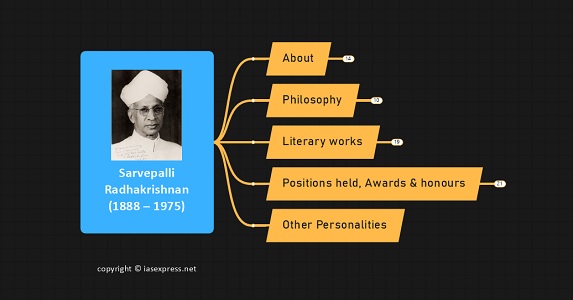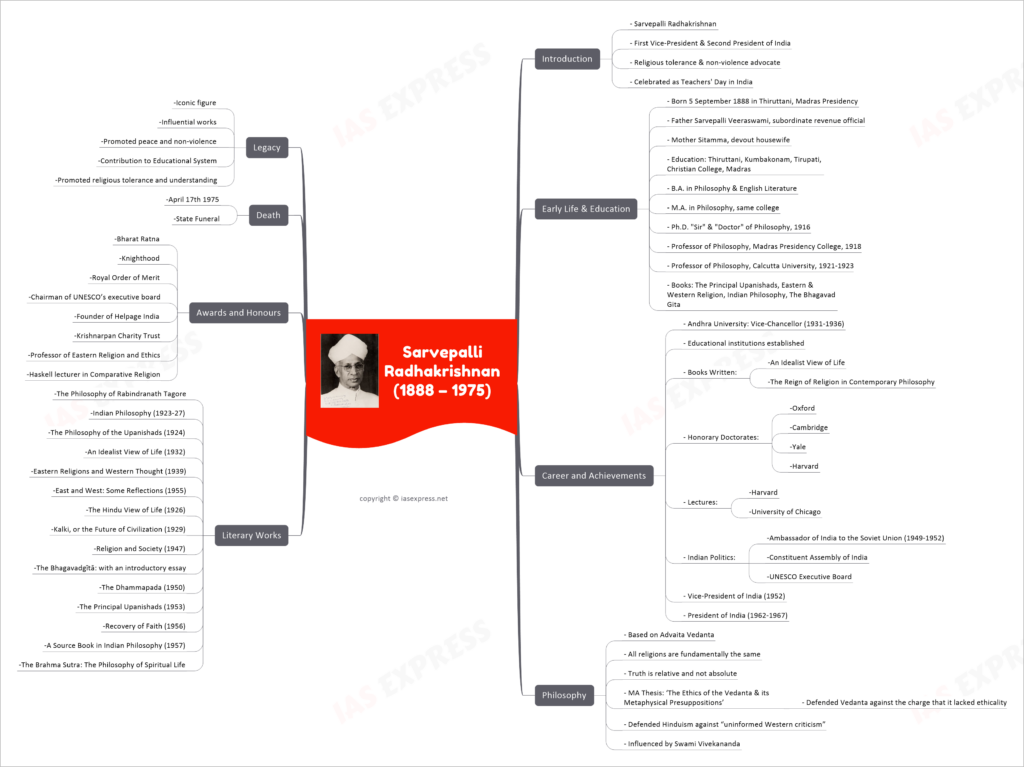Sarvepalli Radhakrishnan (1888-1975) – Biography, Contributions, Works

Prelims Sureshots » Important Personalities of Modern India
Sarvepalli Radhakrishnan was an illustrious Indian philosopher, academician and statesman who served as the first Vice-President and the second President of India from 1962 to 1967. He was a brilliant student from a young age and went on to become one of the most influential figures in Indian history. Radhakrishnan was a renowned scholar of Hinduism, Indian philosophy, and comparative religion, and his works have been translated into numerous languages. He was a prominent advocate of religious tolerance, peace and non-violence, and he was influential in shaping the educational system of modern India. His birth anniversary is celebrated as Teachers’ Day in India.

Early Life and Education
Radhakrishnan was born in Thiruttani, Madras Presidency, British India on 5 September 1888. His father, Sarvepalli Veeraswami, was a subordinate revenue official in the service of a local zamindar (landlord). His mother, Sitamma, was a devout housewife. Radhakrishnan was educated in Thiruttani, Kumbakonam, and Tirupati, and attended Christian College in Madras for his undergraduate degree. After completing his B.A. in philosophy and English literature, he went on to pursue an M.A. in philosophy from the same college.
Radhakrishnan’s academic career was illustrious, and he was awarded the prestigious titles of “Sir” and “Doctor” of Philosophy (Ph.D.) in 1916. He was appointed professor of philosophy at the Madras Presidency College in 1918, and then professor of philosophy at the Calcutta University from 1921 to 1923. During this time, he wrote several books, including The Principal Upanishads, Eastern and Western Religion, Indian Philosophy, and The Bhagavad Gita.
Career and Achievements
Radhakrishnan was appointed Vice-Chancellor of Andhra University in 1931 and served in this position for five years. During his tenure, he established several educational institutions and wrote several books, including An Idealist View of Life and The Reign of Religion in Contemporary Philosophy. In 1936, he was appointed Spalding Professor of Eastern Religions and Ethics at the University of Oxford.
Radhakrishnan was widely recognized for his scholarship, and he was awarded honorary doctorates from several universities, including Oxford, Cambridge, Yale, and Harvard. He was also invited to deliver lectures at major universities around the world, including Harvard and the University of Chicago.
Radhakrishnan was active in Indian politics and served as the Ambassador of India to the Soviet Union from 1949 to 1952. He was also a member of the Constituent Assembly of India and the UNESCO Executive Board. He was appointed Vice-President of India in 1952, and in 1962 he became the second President of India, serving until 1967.
Philosophy
Radhakrishnan was a great philosopher and thinker, and his works have been widely studied and admired. His philosophy was based on Advaita Vedanta, which is a form of Hinduism that emphasizes the essential unity of all existence. He believed that all religions are fundamentally the same, and that truth is relative and not absolute.
His thesis for his MA degree was titled, ‘The Ethics of the Vedanta & its Metaphysical Presuppositions’. In this paper, he defended Vedanta against the charge that it lacked ethicality. He defended Hinduism against “uninformed Western criticism” and played a major role in the formation of contemporary Hindu identity. He was deeply influenced by Swami Vivekananda.
Literary Works
Radhakrishnan’s literary works were quite impressive. His book, ‘The Philosophy of Rabindranath Tagore’, attracted global attention to Indian philosophy. His other works include Indian Philosophy (1923-27), The Philosophy of the Upanishads (1924), An Idealist View of Life (1932), Eastern Religions and Western Thought (1939), East and West: Some Reflections (1955), The Hindu View of Life (1926), Kalki, or the Future of Civilization (1929), Religion and Society (1947), The Bhagavadgītā: with an introductory essay, The Dhammapada (1950), 194 pages, Oxford University Press, The Principal Upanishads (1953), Recovery of Faith (1956), A Source Book in Indian Philosophy (1957), and The Brahma Sutra: The Philosophy of Spiritual Life.
Awards and Honours
- Radhakrishnan held several important positions and was awarded many honours.
- He was awarded the Bharat Ratna, India’s highest civilian award in 1954.
- He received a knighthood in 1931.
- However, after India’s independence, he stopped using his title ‘Sir’ and used the prefix ‘Dr.
- He was also given honorary membership of the British Royal Order of Merit in 1963.
- He was elected chairman of UNESCO’s executive board in 1948.
- He was one of the founders of Helpage India, a renowned NGO for elderly underprivileged in India.
- He also had formed the Krishnarpan Charity Trust along with Ghanshyam Das Birla and some other social workers.
- He was the first Indian to hold a chair at the University of Oxford as a Professor of Eastern Religion and Ethics (1936-1952).
- In 1930, he was appointed Haskell lecturer in Comparative Religion at the University of Chicago.
Death
Radhakrishnan died at his home in Madras (now Chennai) on 17 April 1975 at the age of 86. He had been in ill health for some time leading up to his death. His death was widely mourned in India, and he was accorded a state funeral.
Legacy
Radhakrishnan is remembered as one of India’s most iconic figures in modern history. His works remain influential, and his philosophy of tolerance, peace, and non-violence has been widely adopted in India and around the world. He is also remembered for his contribution to the educational system of modern India, and for his efforts in promoting religious tolerance and understanding.

